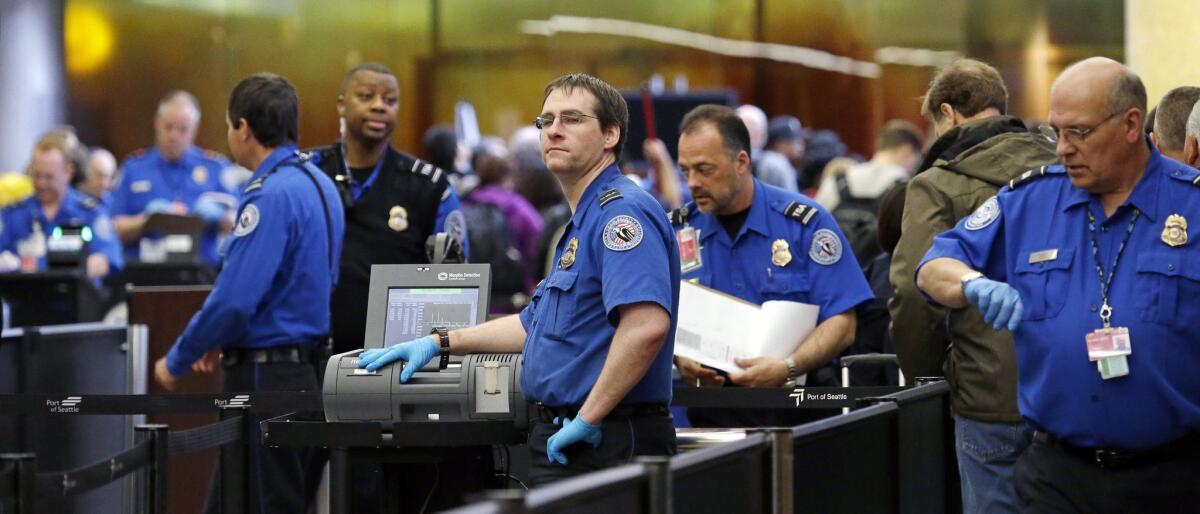Op-Ed: Let’s consider alternatives to the dysfunctional TSA

TSA agents work at a security checkpoint at Seattle-Tacoma International Airport in SeaTac, Wash.
- Share via
Even the most cynical critics of the Transportation Security Administration, perhaps the most unpopular organization in the whole U.S. government, must have been surprised by the recent revelations. According to a leaked internal report, TSA Red Team members, whose job is to test performance, were able to get past security with hidden weapons on 67 out of 70 occasions, or 95% of the time.
The shock of this leak has caused a ruckus inside the Beltway. The TSA’s acting director has been “reassigned” — a rare step for an administration that has difficulty firing anyone for anything.
If you’re asking why the TSA exists at all right now, you’re not alone. In the same week that the domestic surveillance component of the Patriot Act has been scaled back, it’s worth pondering whether the TSA, another post-9/11 creation, needs to be mended, or perhaps even ended.
Many regular travelers are irritated by the TSA. They dislike having to remove their shoes and belts and liquids even though it’s obvious they pose no threat. I’ve never seen a nun get a pat-down, but I, like most frequent fliers, have witnessed TSA silliness on multiple occasions. And I have been subjected to interrogation by TSA officials while traveling for the U.S. government, carrying a diplomatic passport, even as foreigners who looked like extras in a B-movie about Al Qaeda went on their way, unquestioned.
Hardly any of the TSA’s rules have to do with real airline security. As a professional in the counter-terrorism field, I watch TSA inspectors doing their job and mostly shake my head. “This is not an airline security system,” opined the former head of security for El Al about the TSA: “This is a system for bothering people.”
In comparison with the airline security programs of many close U.S. allies in Europe and the Middle East, who were grappling with the threat of terrorism long before 9/11, TSA efforts appear comical and ineffective in equal measure.
It would be one thing if the TSA were annoying passengers and, simultaneously, keeping them safe. But the new leak suggests that it’s only proficient at the former, and that it’s therefore a giant waste of taxpayer dollars.
Much TSA dysfunction can be attributed to its devotion to technology as a panacea, which is a very American trait. Skeptics often note that we need to become more like Israel, meaning we need to embrace profiling — not the latest machines — as the main factor in detecting threats to airliners.
Although there is something to this, and the TSA certainly should rely more on profiling, there is no way that little Israel’s security protocol for its few airports can be templated onto our vast, continent-wide travel system.
The Israeli method, which involves rigorous questioning of passengers, does not scale.
So what does reform look like? A revamped TSA must focus on quality, not just quantity, of personnel. And it must abandon the inefficient assembly-line approach in favor of intelligence-driven screening. Terrorists are evolving and learning; we need to evolve and learn too.
I’ve given dozens of talks on terrorism over the years, and the only line that is guaranteed applause from any audience is complaining about the TSA. But I’d feel remiss if I didn’t note that there’s something dangerous about the way the TSA’s dysfunction came to light: an unauthorized leak.
Most of the things that fans of Edward Snowden believe about the National Security Agency — that it’s callous toward citizens, capricious in its authorities and insufficiently respectful of rights — can be more plausibly said to be true about the TSA.
Nevertheless, every leak carries risks. Do we really want terrorists, who still exist and remain highly interested in blowing up Western airliners, to know precisely how ineffective the TSA actually is?
As the security expert Bruce Schneier wrote on his blog, “airport security doesn’t have to be 100% effective in detecting guns and bombs,” it just needs to be good enough to deter terrorists who believe there’s a decent chance of getting caught. But a “95% failure rate is bad, because you can build a plot around sneaking something past the TSA.”
Careless publication of harmful leaks is on the rise and will have consequences.
Two months ago, the online magazine the Intercept, whose main purpose appears to be exposing Western secrets, published a checklist of exactly what TSA screeners are looking for to find terrorists trying to board airliners. Calling that story reckless is kind, since what benefit is there to letting the world know this sort of information?
Terrorists have learned from the Snowden leaks how Western intelligence is trying to find them — that impact has already been felt by counter-terrorist services. Now they also know what the TSA is looking for, and that it’s ineffective.
John R. Schindler is a security consultant and a former National Security Agency counterintelligence officer. He tweets at @20committee.
Follow the Opinion section on Twitter @latimesopinion and Facebook
More to Read
A cure for the common opinion
Get thought-provoking perspectives with our weekly newsletter.
You may occasionally receive promotional content from the Los Angeles Times.










